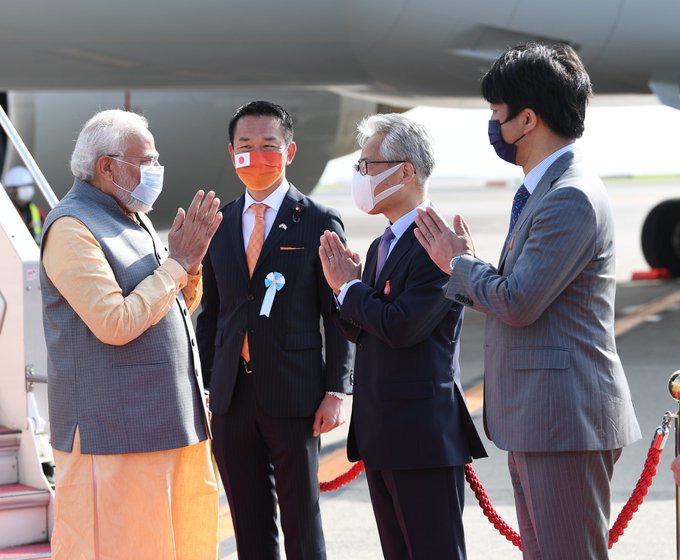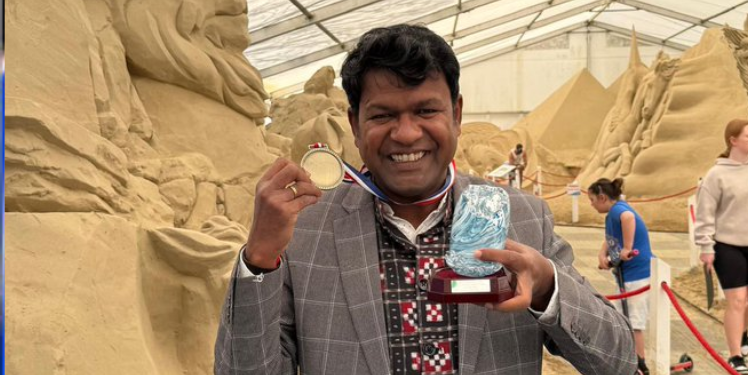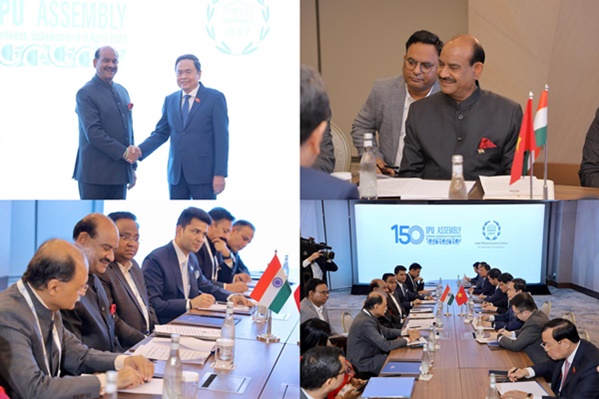PM Modi arrives in Tokyo on two-day visit to participate in Quad Summit
Mon 23 May 2022, 10:11:42

Tokyo: Prime Minister Narendra Modi arrived in Tokyo this morning on a two-day visit to Japan to participate in the Quad Leaders Summit.
Mr Modi was given a rousing welcome from the Indian diaspora at the Hotel where he will be staying during his trip. People from Indian diaspora cheered and waved Indian flags seeing the Prime Minister.
Many children along with their parents were present at the hotel, waving their hands at the Prime Minister's arrival. Kids were seen holding placards with the word "Welcome" written in different Indian languages. The Prime Minister also interacted with one of the kids present there and signed an autograph for him.
Prime Minister Modi thanked Indian diaspora in Japan for the warm welcome. In a tweet, he said, Japan’s Indian community has made pioneering contributions in different fields. Mr Modi said, they have also remained connected with their roots in India.
Apart from participating in the Quad Summit tomorrow, Mr Modi will hold bilateral meetings with US President Joe Biden, Prime Minister of Australia Anthony Albanese, and Prime Minister of Japan Fumio Kishida.
Today, Mr Modi will engage with the Japanese business community and the Indian diaspora.
The upcoming Quad Summit in Tokyo will provide an opportunity to take stock of the progress made so far on Quad's initiatives and also give guidance for the future.
This will be the fourth interaction of Quad leaders since their first virtual meeting in March last year. Quad brings together four countries united by their commitment to a free, open, and inclusive Indo Pacific. Quad leaders have put forth ambitious initiatives across areas like COVID and global health, infrastructure, climate, people-to-people exchanges, education, cyber security, and space. Continuing cooperation on COVID response and post COVID management of economy and health infrastructure are also important elements.
Under the Quad Vaccine Partnership, vaccines have been delivered to Cambodia and Thailand. In the Summit, the leaders will review progress of Quad initiatives, identify new areas of
cooperation and provide strategic guidance for future collaboration.
cooperation and provide strategic guidance for future collaboration.
Prime Minister Modi will have a bilateral meeting with US President Biden tomorrow. The multifaceted India-US relationship has acquired momentum, has depth, and is diversified. Both nations' long-standing cooperation in diverse areas, ranging from trade, defence, security, climate, education, and energy is on an upward trajectory.
There is a regular exchange of visits and dialogue which are not limited to the bilateral agenda but also include issues of regional and global importance. The Prime Minister’s meeting with President Biden will mark the continuation of these high-level dialogues and provide guidance and vision to take the relationship forward.
Mr Modi will also meet his Japanese counterpart on the sidelines of the Summit. Japan is among India's most important partners. Prime Minister Modi has referred to India-Japan relationship as one of the most natural in the region. In the last few years, India-Japan Special Strategic and Global Partnership has seen great momentum. This meeting between the two Prime Ministers will be an opportunity to carry forward the high-level engagement between the two countries as also to advance bilateral cooperation agenda.
The Japanese Prime Minister's recent visit to India saw substantial outcomes, which included a target of five trillion yen, approximately 40 to 42 billion dollars in public and private investment and financing over the five years, and adoption of several other key outcome documents.
In Tokyo, the two Prime Ministers will continue their discussions on how to further deepen bilateral economic cooperation, including in trade and investment, clean energy, cooperation in the northeast, people to people ties, digital partnership, and of course exchange perspectives on common issues of regional and global importance.
In the bilateral meeting with the Australian Prime Minister, the two leaders would review the India-Australia Comprehensive Strategic Partnership and exchange views on regional and global developments of mutual interest.
No Comments For This Post, Be first to write a Comment.
Most viewed from Specials
Most viewed from World
AIMIM News
Latest Urdu News
Most Viewed
May 26, 2020
Do you think Canada-India relations will improve under New PM Mark Carney?
Latest Videos View All
Like Us
Home
About Us
Advertise With Us
All Polls
Epaper Archives
Privacy Policy
Contact Us
Download Etemaad App
© 2025 Etemaad Daily News, All Rights Reserved.






















.jpg)
.jpg)
.jpg)

















